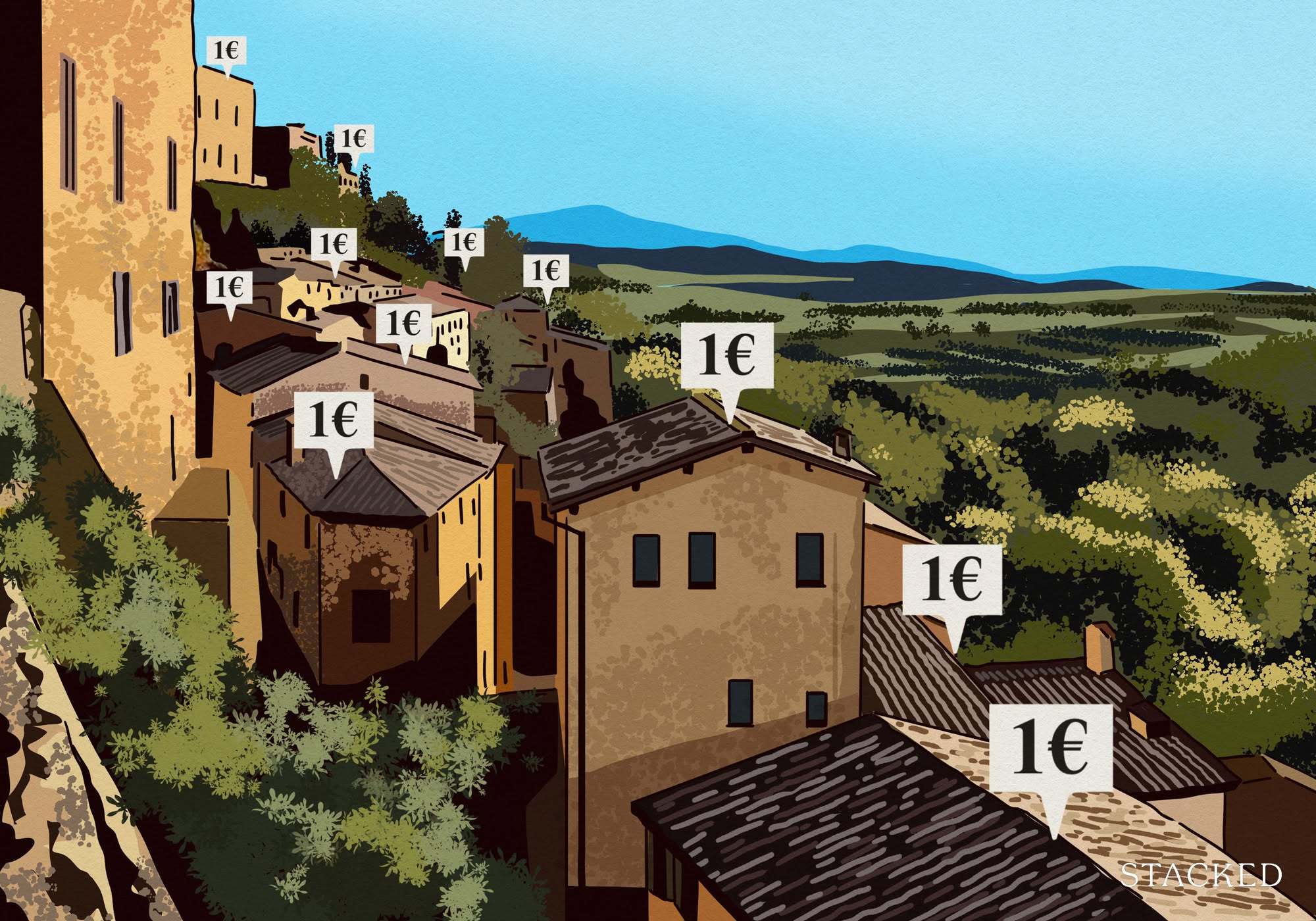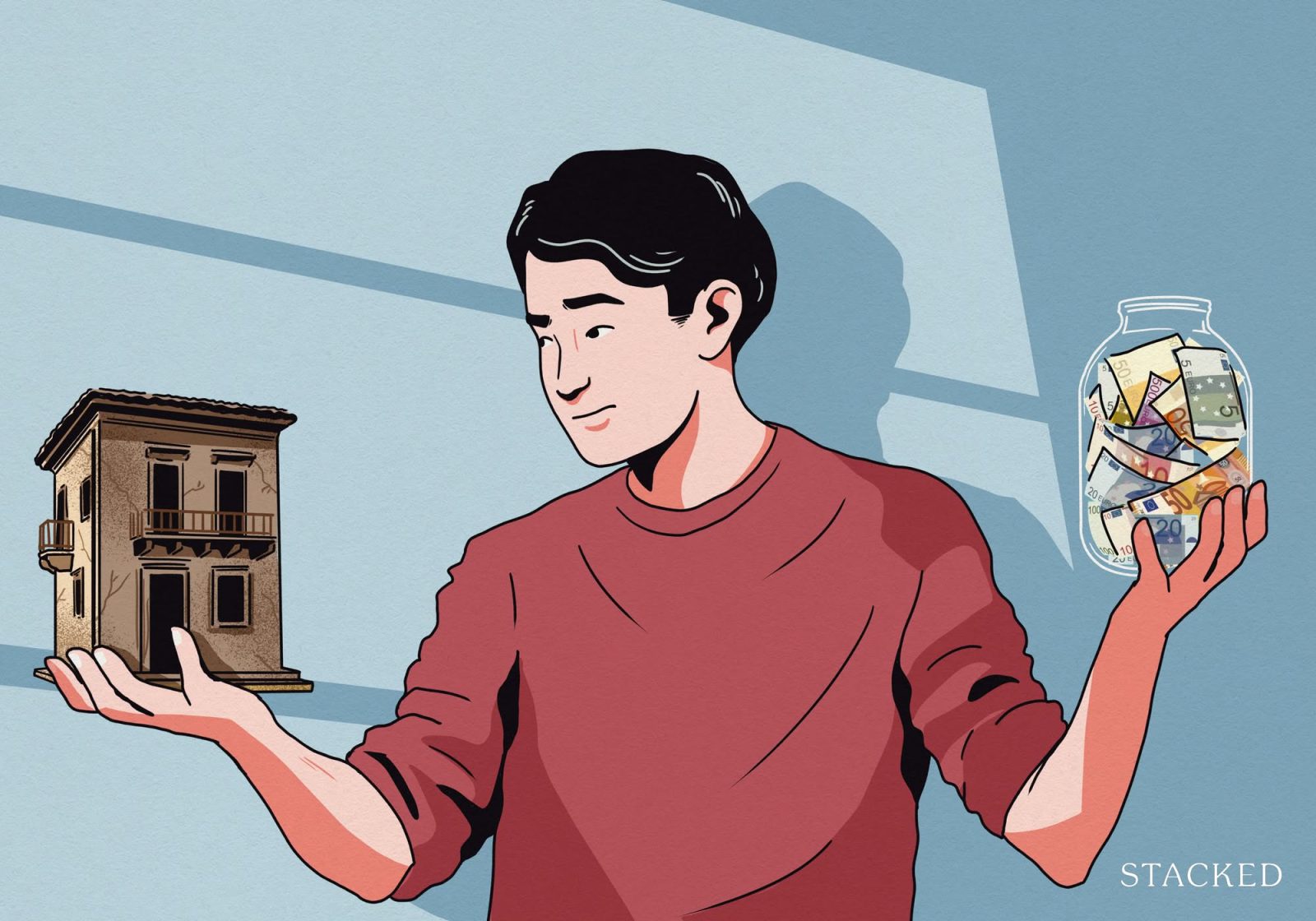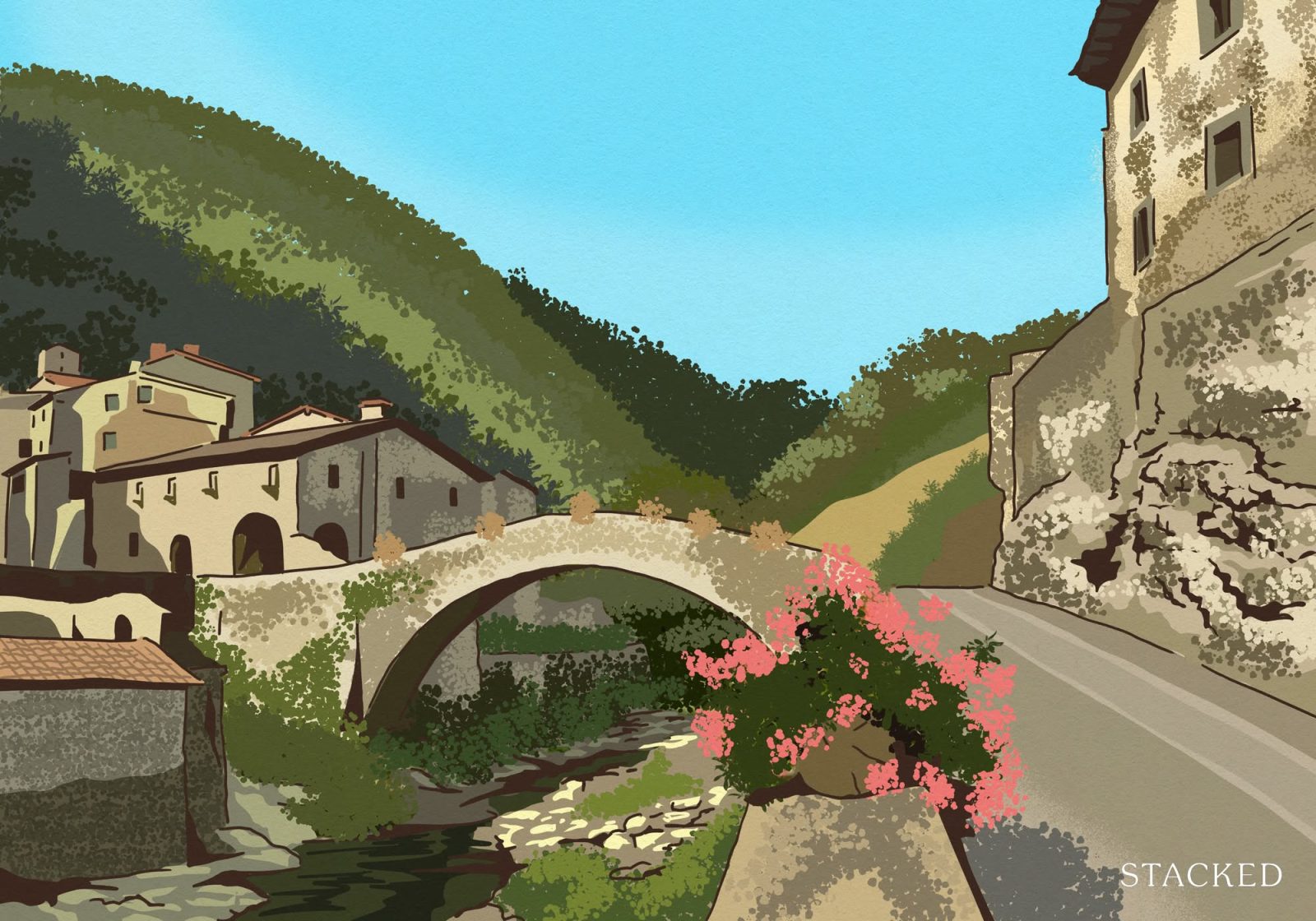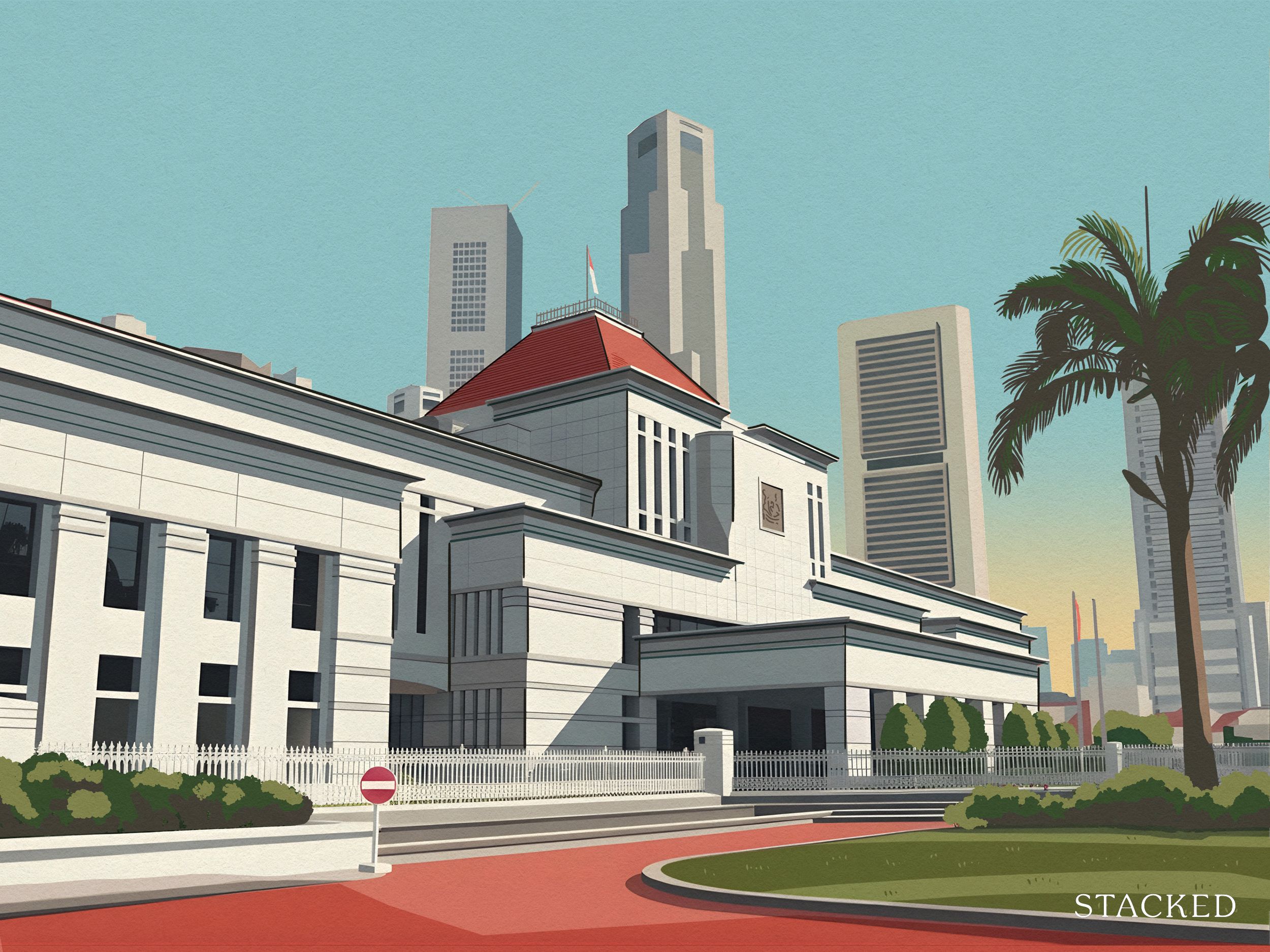Can You Really Buy A House In Italy For €1? Here’s What Singaporeans Should Know
July 12, 2025

The Italian housing market has always been quite intriguing for me; so during my search, finding out I could buy a house in Italy for the price of an espresso sounded like a dream. These €1 homes – often tucked away in charming old towns – have made their rounds on social media and travel blogs. For Singaporeans faced with high prices in both local and overseas markets, this seems like an irresistible opportunity.
But while the initial price tag grabs attention, the reality behind these ultra-cheap homes comes with plenty of fine print; and a renovation bill that can eclipse the cost of a resale condo’s renovation back home.
Let’s break down what you’re really getting into:
What’s the catch?
The €1 figure is real, but it’s typically just the starting bid. So yes, people bid, and the end price can be much higher. Also, these homes are sometimes abandoned and structurally unsound; the municipalities are auctioning them off in hopes of revitalising them (and by extension, parts of their ageing towns.) If you’re lucky and unopposed, you might secure it for that token amount. But if others are eyeing the same listing, the bid price can creep up.
After you win the bid, you can expect to pay additional fees; typically notary and legal costs of €2,000 to €6,000, depending on the property and region, and administrative charges (varies by location, and not always indicated in the initial price tag.)
All in, your cheapest possible entry could be around €6,001 (~S$8,900) – and that’s before you touch a single wall or tile. More attractive homes – such as better-maintained ones or those closer to picturesque areas – will naturally draw higher bids, so you might pay a lot more for the crème de-la-crèm houses.
The realistic cost of needed renovations

Here’s where things get real. Nearly all €1 home schemes come with a mandatory renovation clause. You can’t just buy the property and leave it sitting. You’ll need to commit to restoring it, usually within a fixed timeframe (e.g., 1 to 3 years). Because these homes are often very old, these are roughly the kind of costs you’re looking at:
Common minimum spend requirements:
- €20,000 to €50,000 (varies by town)
- Actual average renovation cost: €1,500 to €2,000 per sqm
- For an 80 sqm home, you’re looking at €120,000 to €160,000
And that’s just for the basics: structural repairs, plumbing, wiring, heating. If the home is under heritage protection (as many are), your renovations may also need to comply with preservation guidelines, which can increase costs and limit what you can change.
Some buyers have reportedly spent €300,000 or more to make their €1 home liveable. In one notable case, an American financial advisor claimed she ended up spending €440,000 (~S$640,000) on her €1 home. So suddenly, that “cheap” Italian escape could cost more than the deposit on a landed home in Singapore!
Also, for those of you who have had to work with contractors or Interior Designers before, you may be aware of how even small miscommunications lead to high costs, and frustrating delays. In the context of these €1 homes, you’ll probably be dealing with foreign designers and contractors; you’ll have to be extra patient and careful, as there’s a further communication barrier. And of course, if anything goes wrong, it’s much tougher to deal with legal proceedings in a whole other jurisdiction.
The reality of living in small Italian municipalities

Even if you’re willing to spend on the rebuild, living in a remote Italian village isn’t for everyone.
Some municipalities require that you live in the home full-time or for at least six months a year. This makes sense: they want committed residents, not absentee investors. But it also means adjusting to a lifestyle that’s worlds apart from urban Singapore.
More from Stacked
Are Older HDB Maisonettes And Jumbo Flats Worth the Premium? A Deep Dive Into Pricing Trends
In recent years, executive maisonettes and jumbo flats have been known to defy gravity and logic, in terms of market…
Small towns often lack:
- Advanced healthcare facilities
- Reliable public transport
- Large grocery stores or job markets
- High-speed internet (a dealbreaker for remote workers)
It’s romantic until you need to see a doctor, send your kids to school, or get a plumbing issue fixed in winter. This might also make it a risky environment for older buyers, or those with health and mobility issues.
That said, it’s not fair to paint every small town as lifeless. Some are seeing a tourism-driven revival, with new cafés, art spaces, and even digital nomad communities forming. Think of it like buying in a non-mature estate: the infrastructure might not be perfect now, but there’s potential if you’re patient and realistic.
However, that also means you need to know the region well enough to recognise growth potential versus just a dead-end. This kind of expertise may require you to live in the region for a long time, before you have the acumen to judge different towns.
What many buyers actually end up buying
Here’s a not-so-secret truth: many people start out eyeing €1 homes, but end up buying something more practical nearby. The reason is the affordability of newer or more convenient homes. Italy also has many affordable homes outside the €1 scheme, typically priced between €5,000 and €40,000 (~S$7,250 to S$58,000). These are often in better condition and may even be move-in ready.
This is an amount that’s unheard-of in Singapore, way below even the cheapest HDB flats; and these are for full landed houses in a true countryside. So after you factor in the renovation costs of the €1 houses, it’s not surprising that a lot of the buyers flock to these options instead.
That said, buyers should still budget for additional costs:
- Notary and admin fees: typically one to 2.5 per cent of the purchase price
- Legal representation: optional, but highly recommended for foreign buyers unfamiliar with Italian property law
A good lawyer can help verify titles, draft contracts with proper protections, and ensure you’re not unknowingly buying into a long-forgotten family dispute over land rights.
It’s not some kind of trick, but it’s not as easy as it looks either
If you’re serious about buying one of these homes, here’s the best advice: go and see it in person. Live in the town for a while. Speak to residents. Understand what you’re getting into.
Many of the best opportunities aren’t even listed online; they’re shared through local agents or word-of-mouth. And your odds of success (and happiness) are much higher when you’re on the ground. This is similar to the situation back in Singapore. E.g., a foreigner may not realise that living one-stop away Paya Lebar makes a huge difference in price, but not in convenience; but locals know how to spot these nuances. Likewise, in Italy, being physically present allows you to uncover those under-the-radar towns with livable homes, friendly communities, and far fewer bureaucratic hurdles than the big-name €1 listings.
Yes, it’s possible to own a charming Italian home for far less than what you’d pay in Singapore: but only if you go in with eyes wide open.
If you’re prepared for the renovation costs, legal complexity, and lifestyle changes, these homes can offer an incredibly unique experience. But if you’re looking for a bargain holiday home you can Airbnb next month… this probably isn’t it.
At Stacked, we like to look beyond the headlines and surface-level numbers, and focus on how things play out in the real world.
If you’d like to discuss how this applies to your own circumstances, you can reach out for a one-to-one consultation here.
And if you simply have a question or want to share a thought, feel free to write to us at stories@stackedhomes.com — we read every message.
Melody Koh
Melody is a designer who currently works in Tech and writes for fun. Her latest obsession is analysing and writing about real estate affordability for the younger generation. Coming from an Industrial Design background, she has a strong passion for spatial design and furnishing . Having worked in Finance for almost a decade, Melody has a keen interest in sustainable investments and a nose to sniff out numbers that don't make sense.Need help with a property decision?
Speak to our team →Read next from Editor's Pick

Editor's Pick Happy Chinese New Year from Stacked

Property Market Commentary How I’d Invest $12 Million On Property If I Won The 2026 Toto Hongbao Draw

Overseas Property Investing Savills Just Revealed Where China And Singapore Property Markets Are Headed In 2026

Property Market Commentary We Review 7 Of The June 2026 BTO Launch Sites – Which Is The Best Option For You?
Latest Posts

Pro River Modern Starts From $1.548M For A Two-Bedder — How Its Pricing Compares In River Valley

New Launch Condo Reviews River Modern Condo Review: A River-facing New Launch with Direct Access to Great World MRT Station

On The Market Here Are The Cheapest 5-Room HDB Flats Near An MRT You Can Still Buy From $550K




































0 Comments